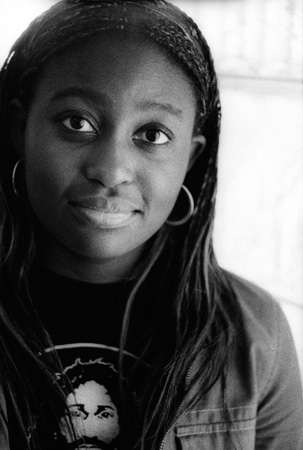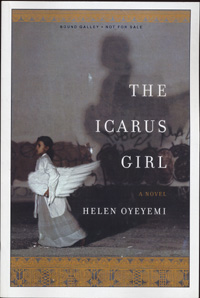Excerpt from The Icarus Girl.
|
Helen Oyeyemi is the bright, young author of The Icarus Girl, a successful first novel written just before her nineteenth birthday. A story of an alienated, eight-year-old Jessamy Harrisson, born to Nigerian and British parents, the novel deals with issues of cultural identity, Nigerian mythology and the mental psychosis of a young child struggling to understand who she is. Her imaginary friend Tilly Tilly, short for Titiola, whom she meets in Nigeria, at first brings Jess friendship, then later becomes a controlling, dangerous influence in her life, playing a pivotal, chilling role in the novel. The Icarus Girl was inspired by a character Helen had created at thirteen, named Tilly Tilly, as part of a series of short stories. Tilly Tilly was a young girl who somehow managed to destroy her friends psychologically or damage their family relationships in some way. “When I started The Icarus Girl, I thought it was going to be another short story about Tilly Tilly,” begins Oyeyemi, “but then I knew it was different straight away because Tilly Tilly didn’t come into the story for a long time. I guess I knew instinctively that Jess would be an antagonist to Tilly Tilly. When I looked at it, I thought, this is the strongest thing I’ve ever written!” Sitting in the cozy lounge area of the Westin Harbourcastle Hotel, along with AfroToronto.com’s Editor-in-Chief, Eloi Minka and myself, the soft-spoken author from London comes alive when telling her story. She is in Toronto for the International Festival of Authors. |

author Helen Oyeyemi |
After completing the first 20 pages of the novel, Helen contacted an agent for advice. “I wrote a letter to him asking for advice on how to sustain style. I was 18 and couldn’t see myself finishing a novel. I told him I had written 130 pages, but I had only written 20. He got back to me and said I’d like to see the rest.”
Over the next two weeks, Helen found herself cramming for her A-level exams to get into Cambridge University while writing the requested pages. “In two weeks, I had written the 130 pages. It was like that agent saying I could do it gave me the fire to do it,” says Oyeyemi. “When I sent it to him, I told him I had a computer problem, that’s why it took a while. Later, he told me he didn’t believe me. He knew during those two weeks that I was busy writing the 130 pages! But he wanted to see if I could produce more, and I did.”
During this process, Helen’s parents were unaware that she was writing a novel. “I was telling my parents I was busy doing homework on my computer. It would have been crazy! Can you imagine, here are these Nigerian parents who have been saying ever since I was six, which one will it be: Oxford or Cambridge? I got the offer from Cambridge, and now I have to pass my A-levels. My parents were quite proud of that. If they thought I was sacrificing my grades, they would have just gone crazy!”
“In a way, it seems crazy since I didn’t know if the book would be published. I just couldn’t stop writing the story. I just had it, and I think I realized how valuable it was to actually just have it. I wanted to get it down on paper. All I remember is eating hunks of bread and writing; I just remember crumbs and paper, essentially,” laughs Oyeyemi.
|
In the novel, Nigeria plays a large role as young Jessamy struggles with her cultural identity. “I didn’t anticipate Nigeria coming into the story and becoming such a character,” says Oyeyemi. “I wanted to say something about what it feels like to look at a culture from the outside. It can be scary. You apprehend things in a way even if you don’t understand them. In the book, Jess struggles with the duality of being Nigerian and British. There may be a time when Jess has to choose who she is, but it is not at eight. It goes back to the basic assumptions that you make. Here’s this mixed-race girl they can’t figure out. They want to know if she is black or white.” Some of the novel is autobiographical, stemming from Helen’s own struggles. Born in Nigeria, she immigrated to London when she was four and returned to Nigeria on a family holiday when she was eleven. “My trip back to Nigeria when I was eleven was a shocker. Everyone stared at me quite a lot. They kept presenting me with this girl I couldn’t remember who used to chatter in Yoruba. ... They seemed quite shocked that I could change so much, as though a side of me had disappeared.” One of her favourite novels, Yoruba Girl Dancing by Simi Bedford, also deals with these issues of growing up between two cultures. It was one of the first books Helen was able to relate to. The Nigerian mysticism surrounding twins also plays a role in the story, adding magical, chilling elements to the plot. In Nigeria, twins are regarded as a blessing. However, if one twin dies, an ere Ibeji statue must be made out of wood to protect the remaining twin. If this is not done, misfortune falls on the family, as the spirits seek the life of the remaining twin. As the story unfolds, the cunning Tilly Tilly delivers this frightening news to Jessamy, who is unaware she lost her twin at birth. |
“There are things about Tilly that I don’t understand, and I still don’t understand. People keep asking me who Tilly Tilly is, but I’m not sure I really want to know. To be honest, she is a bit frightening. I think Tilly Tilly being a twin is unusual; I’m not sure where that comes from. I think she also has roots in pre-slavery Nigeria before colonialism.”
“I didn’t do a lot of research for the novel, but I did look up Ibeji statues, though. Growing up in a Nigerian household, there was so much information that flowed over me. Sometimes, my parents would be talking at me, and I’d not be listening, but I think I somehow picked up stuff. They talked about a history before colonialism. I didn’t know these things were significant to me, but when you are a writer, that stuff just shows up in writing,” says Oyeyemi.
An avid reader of books, Helen’s advice to aspiring writers is to read a lot of books and then read some more. Some of her favourites include Nigerian writer Buchi Emecheta, who lives in London and writes about the immigrant experience; Edgar Allan Poe, “who can scare you to the marrow and still leave you able to walk away”, and Edwidge Danticat, author of Breath, Eyes, Memory. “She makes me homesick for Haiti, and I’ve never even been there,” smiles Oyeyemi. Helen’s all-time favourite book is the complete works of Emily Dickinson, which she carries with her everywhere. Her next novel, Peaces, due out in 2007, is based on a poem by Dickinson.
Helen is excited about the future. She is in her final year at Cambridge University as a student of social and political science and looks forward to travelling to Africa to visit several orphanages after graduation. She also has her sights set on independent filmmaking. Whatever road she chooses, this gifted, insightful author is one to watch.
The Icarus Girl is available in bookstores around the city and online at www.amazon.ca.


